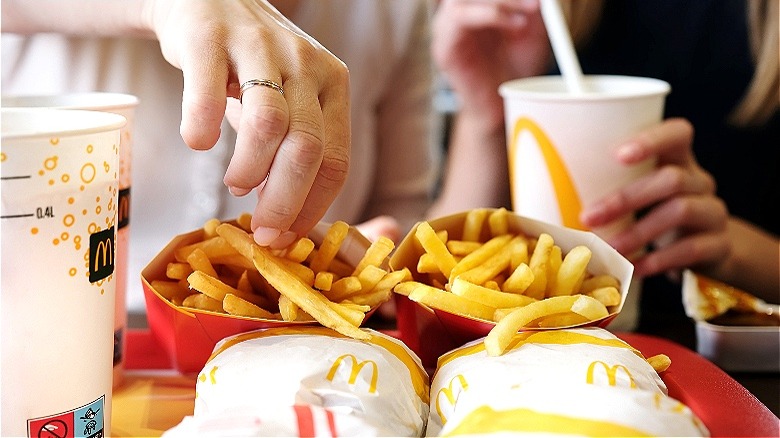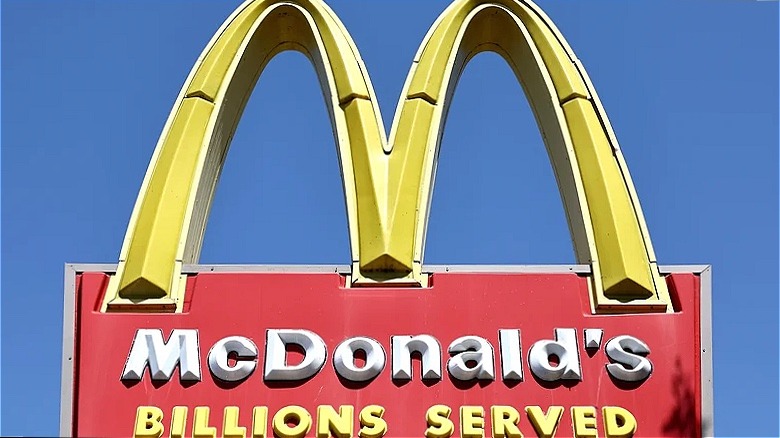How Much Does McDonald's Make Off Of Its $5 Meal Deal?
As the saying goes, there's no such thing as a free lunch, but what about a $5 meal? For a limited time — originally for a month starting June 25, 2024, but extended by McDonald's through August (at least), per CNBC — depending on their region, diners at McDonald's can get a McDouble® or McChicken® sandwich, a four-piece order of Chicken McNuggets®, a small order of fries, and a small drink for $5 (or $6). Here at Money Digest, this offer has us wondering if the company makes any money off of it; though, it should be said that the point of the deal was to increase foot traffic, which McDonald's says has been the case.
In a memo obtained by outlets like CNBC and CNN on July 22, the company said about the deal, "Our message is resonating with our millions of customers. When our customers are ordering the $5 Meal Deal, they aren't visiting the competition, and early performance shows this deal is meeting the objective of driving guests back to our restaurants." With that said, let's take a look at the meal's profits, if any, for McDonald's.
According to MarketWatch, the meal deal has a 1% to 5% profit margin, meaning for every $5 (or $6) combo, McDonald's turns a profit of 5 cents or 25 cents. The fast-food giant is clearly willing to tighten its own belt to create a meal deal customers can sink their teeth into, but why? How? And does everyone under the Golden Arches really think this deal is golden?
McDonald's open letter to customers
Children of the 1980s and 1990s might have a hard time accepting McDonald's as a pricey meal option, but today the average McDonald's item costs 40% more than it did back in 2019, let alone in childhoods before the dawn of fast-food apps. These price increases reflect staffing and supply cost increases, per a May 2024 open letter from McDonald's USA President Joe Erlinger, and are not, Erlinger claims, the result of price-gouging.
"Recently, we have seen viral social posts and poorly sourced reports that McDonald's has raised prices significantly beyond inflationary rates. This is inaccurate," Erlinger explained in the letter, referencing a Connecticut franchisee that sold an $18 Big Mac in 2024. Consumers have grown increasingly watchful over spending more money on things than they should, and one of the pain points is food. Dining out is no longer a budget item for many families, and if it is, they're taking advantage of deals, happy hours, and other restaurant tricks.
While Erlinger listed the Connecticut Big Mac incident as an exception to McDonald's pricing, he admitted the company needs to focus on creating more value for a customer base that has stopped shopping for so-called "luxuries" like fast food during this inflation era. "It's clear that we — together with our franchisees — must remain laser-focused on value and affordability," Erlinger wrote. The company's open letter came just weeks after outlets first reported on the new $5 McDonald's meal deal, and after a prolonged discourse with reluctant franchise owners.
McDonald's finds success with its $5 meal
Bloomberg reports the $5 meal deal was initially rejected by McDonald's franchise owners who felt there wasn't enough profit to sustain the deal, even for the limited-time offering period. However, the second proposal from McDonald's corporate was accepted — possibly because Coca-Cola agreed to subsidize the promotion.
Back when he shared McDonald's open letter, McDonald's USA President Joe Erlinger certainly hoped the deal would cool fears of too-tight margins as customer return rates increased as a result of the offer. As noted, the promotion's success has led to many locations (93% to be exact) extending the offer through August, and maybe beyond that. Much like Costco's cheap rotisserie chicken, the $5 McDonald's meal deal is an item that may not make the most money itself, but it's bringing (back) in customers.
What's more, the deal has also sparked a fast-food price war, inspiring other restaurants to bundle their own low-cost, low-priced deals to lure customers. BTIG analyst Peter Saleh told Barron's (via MarketWatch) the industry is facing a "race to the bottom, with all these companies discounting to try to retain market share." What will it take to fight inflation and fill bellies on a budget? Wealthy business owners and frustrated franchise operators may not know, but one thing is certain: Hungry consumers on a budget will have a tasty time finding out.


